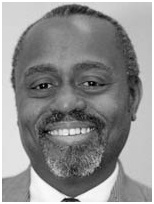Sekazi Mtingwa
The Power of Physics: In the Classroom and Abroad
Sekazi Mtingwa’s passion for the field of physics has allowed him to leave his mark in the classroom at multiple universities, in South Africa, and in the laboratory through his own research on accelerators and high energy physics. As he promotes the power of science, both nationally and internationally, Mtingwa is helping researchers collaborate. At the same time he is committed to guiding African-American students.
“For as long as I can remember I have felt a closer kinship with the field of physics,” said Mtingwa, who also had strong interests in other subjects such as mathematics and music. However it was during high school that he became fascinated with the theory of relativity.
Born Michael Von Sawyer, Mtingwa expressed strong interests in Pan-Africanism early on in his career; believing in the philosophy of black people across the world working together. During his studies at Princeton University, he changed his name to the Tanzanian one he uses today.
In an effort to share his love for the field of physics and his fascination with African culture, Mtingwa works extensively with colleagues on an international level. One observes in his work the powerful outcome of unifying researchers. In 2002, for example, he helped to establish the African Laser Centre, a non-profit organization based in Pretoria, South Africa. The organization promotes research and training programs at major laser research facilities, provides grants for studies, host conferences, and helps to expand the existing infrastructure of laser research facilities in Africa.
“People were mainly working in isolation, the biggest outcome of the center is the collaboration with other researchers,” said Mtingwa who travels to Africa about twice a year.
Mtingwa also currently works as the Senior Physics Lecturer in Concourse at MIT and is the Faculty Director of Academic Programs in MIT’s Office of Minority Education.
He received his Bachelors of Science degree in both physics and mathematics in 1971 from MIT and his Masters and Ph.D degree in theoretical high energy physics from Princeton University in 1976.
He also held postdoctoral positions at the University of Rochester and the University of Maryland, College Park, before serving as a Ford Foundation Postdoctoral Fellow with the Fermi National Accelerator Laboratory. There, he and colleague, James Bjorken developed the theory of intrabeam scattering, which is being used in many modern accelerators today. Mtingwa then went on to work at the Argonne National Laboratory in Illinois.
In 1991, as part of an effort to work more directly with African-American students, Mtingwa took an appointment as Professor of Physics at North Carolina A&T State University. There he also served as Department Chair from1991-1994 . Seeing the need for better training and more faculty members in the field of physics, Mtingwa supplied the foundations for the current physics graduate program.
“I tried to get more African-Americans involved and wanted to ensure that the students had all of what they needed,” said Mtingwa.
After leaving North Carolina A&T, he served two years as Martin Luther King Jr., Visiting Professor of Physics at MIT and two years as Visiting Professor of Physics at Harvard University. These appointments were from2001-2005. As an educator, Mtingwa says he believes in the need to encourage interest in the sciences at an early age.
“The study of high-energy physics is almost dead in the U.S. It is mostly led by laboratories in Japan and Europe. We need all the man-power we can get,” said Mtingwa. “We need to break the anxiety people feel about the sciences, the number of people taking physics is low, however it is one of the most fundamental areas out of all of the sciences.”
Mtingwa’s career activities also include serving on the U.S. Department of Energy’s Nuclear Energy Research Advisory Committee from1998-2008 . While a member, he worked on the Subcommittee for Isotope Research and Production Planning and helped to push the increase of federal funds to universities. Mtingwa continues to serve on the Subcommittee on Advanced Nuclear Transformation Technology.
In 2008, he was named a Lifetime Achievement Finalist by the Benjamin Banneker Institute in Washington D.C. and he was also named a Fellow of the American Physical Society.
“I am equally connected to my teachings and research,” said Mtingwa. Away from the sciences, Mtingwa enjoys Russian Literature, studying foreign languages and taekwondo where he holds a black belt.
Mtingwa, age 60, has been married to Estella Johnson for 32 years and they have two daughters, Makazi and Sharifa Mtingwa.



One Response to Sekazi Mtingwa